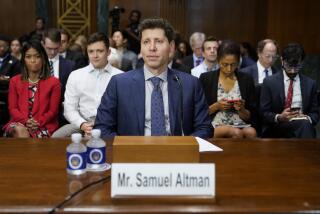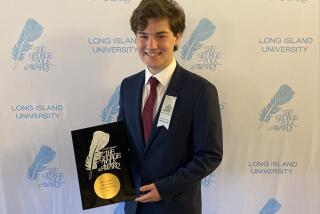Genentech Ousts CEO Over Conflict Question : Biotech: G. Kirk Raab says his negotiations with Roche on Genentech’s behalf were ‘fair, rigorous and competitive.’
- Share via
Biotechnology pioneer Genentech Inc., in an embarrassing disclosure that stunned the industry, said Monday that it had ousted Chief Executive G. Kirk Raab after he sought a $2-million personal loan guarantee from the company’s largest shareholder, Swiss-based Roche Holdings.
Genentech, one of the world’s premier biotechnology firms, quickly named Arthur D. Levinson, a low-profile but highly regarded scientist and senior vice president, to succeed Raab as chairman and CEO.
Analysts said Raab’s departure from the South San Francisco-based firm, although highly troubling, would not have a significant impact on Genentech’s future prospects--which are considered generally bright.
“It’s an embarrassment,” said Meirav Chovav, an analyst with Salomon Bros. in New York. “It’s sort of like sitting in a fancy restaurant with a white suit on and having a big chunk of steak fall in your lap.”
Genentech’s directors asked for Raab’s resignation on Friday. Several weeks earlier, they had learned that the forceful 59-year-old executive, who had been CEO for five years--had discussed obtaining a $2-million loan guarantee from Roche. Company officials said the request was made last spring, while Raab was negotiating the possible purchase of all of Genentech’s stock by Roche, a Swiss pharmaceutical giant that already owned 66% of the firm.
Genentech officials were unaware of the loan discussions until they were alerted by attorneys representing shareholders suing the companies over an agreement reached in May to extend Roche’s longstanding option to buy out Genentech.
Following the disclosure, Genentech created a special independent board committee to investigate the matter. And on Friday, the board confronted Raab and asked for his resignation.
Genentech said Monday that it had agreed in principle to settle the shareholders’ class-action lawsuit.
In a statement, Raab insisted that his negotiations with Roche on Genentech’s behalf were “fair, rigorous and competitive.” Raab, who did not respond to a request for an interview, added: “I regret that I may have created the perception of a conflict of interest with Roche by seeking assistance on a personal loan.”
Genentech said it retained investment banker Morgan Stanley since the disclosure of the loan discussions to evaluate the fairness of the Roche deal. According to the company, Morgan Stanley concluded that the deal was fair to Genentech shareholders.
Raab received a salary of $782,250 and earned a $400,000 bonus last year. Laura Leber, a spokeswoman for Genentech, said she did not know for what purposes Raab had sought the loan.
Genentech’s stock closed unchanged Monday at $49 on the New York Stock Exchange.
Analysts expressed amazement that Raab--who until this month was chairman of the biotech industry’s major trade group--would not have recognized the potential for a conflict.
“This was not a very smart thing to do,” Chovav said. “But I don’t see any devious intent.”
Edmund Debler, an analyst with Mehta & Isaly in New York, said the loan disclosure might have been the last straw for Genentech directors already displeased with Raab’s leadership.
The company, he and other observers noted, has been hurt by publicity over what critics call Genentech’s overly aggressive marketing tactics. In particular, the firm has been battered by accusations that it crossed legal and ethical lines in promoting its Protropin product, a genetically engineered drug that can help short children grow taller.
The Food and Drug Administration began an investigation last year into Genentech’s marketing of the drug.
And a federal grand jury in Minneapolis indicted Edmon R. Jennings, a former vice president of sales and marketing for the firm, alleging he was involved in an illegal kickback scheme intended to boost sales of Protropin.
Genentech was not named in the indictment.
Separately, Raab’s wife, Mollie, agreed in November, 1990, to pay a $162,400 fine to settle Securities and Exchange Commission charges that she tipped off her brother about Roche’s purchase of a stake in Genentech.
Neither Kirk Raab nor Genentech was named in the SEC complaint.
Raab’s supporters said he will be missed for the key role he played in spearheading industry lobbying efforts in Washington and Sacramento.
“He was our point man on Capitol Hill during the health care reform debate” last year, noted Carl Feldbaum, executive vice president of the Biotechnology Industry Organization.
Genentech’s revenue has nearly doubled to about $800 million, and annual earnings tripled to $125 million during Raab’s tenure as CEO.
Employees seemed to take the turmoil in stride Monday, generally expressing high regard for Raab’s replacement, Levinson, a 15-year veteran of the company.
“Kirk was a necessary addition at the time he was brought in, but Art is more of a Genentech community type of guy,” said one employee who asked not to be named.
Another employee described Raab as “aloof and arrogant,” and noted that Levinson is regarded as “a very hard worker with a good way with people.”
Levinson, 45, has a doctorate in biochemistry from Princeton University.
He joined Genentech in 1980 as a senior scientist and became a vice president in 1990 and a senior vice president in 1993.
Dressed casually in a sweater and khaki pants as he exited the company cafeteria Monday afternoon, Levinson told The Times: “This is nothing I aspired to, but being called upon, I wanted to help. Of course it’s a big job, but I’m excited about it.”
*
Times staff writer Julie Pitta in South San Francisco contributed to this report.
More to Read
Inside the business of entertainment
The Wide Shot brings you news, analysis and insights on everything from streaming wars to production — and what it all means for the future.
You may occasionally receive promotional content from the Los Angeles Times.










